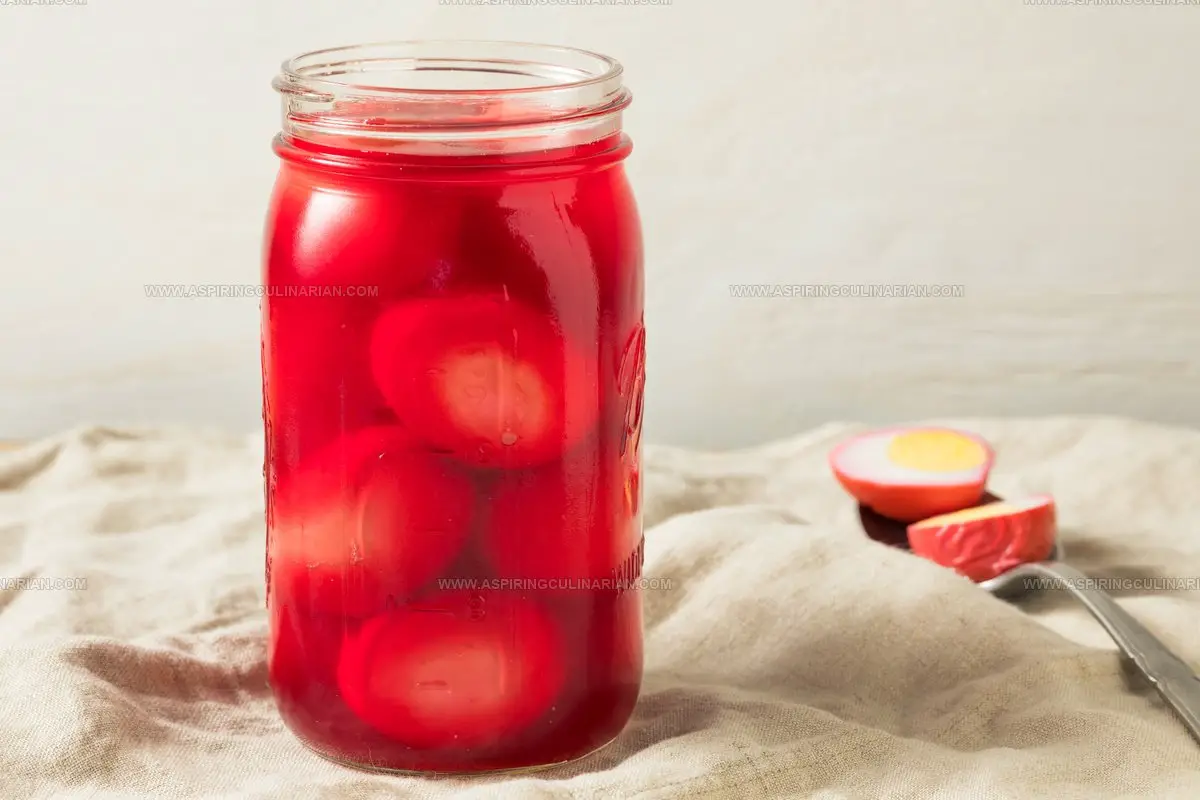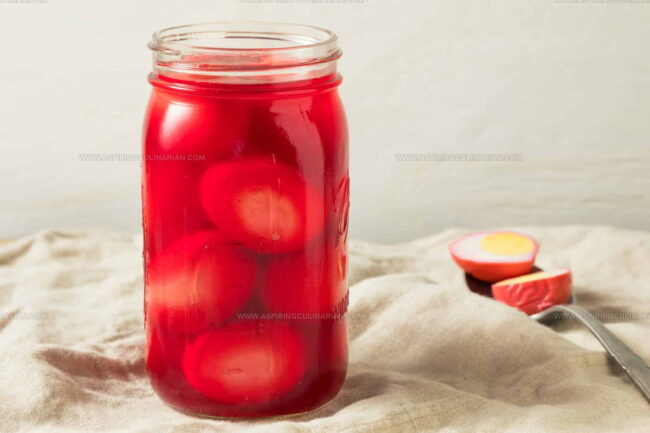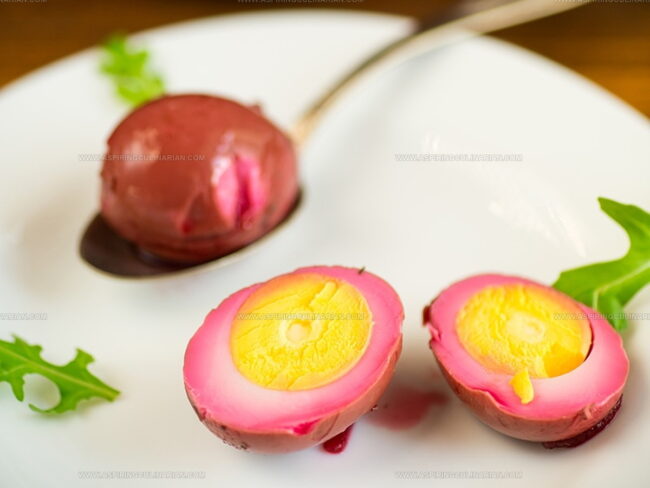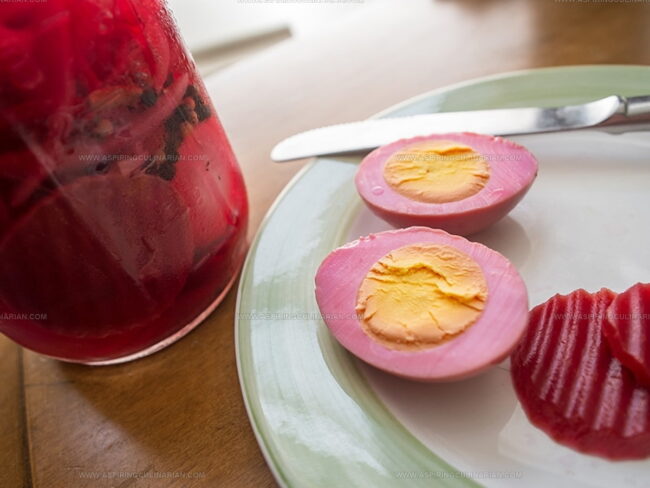Pickled Eggs Taste Like: Tangy Treasures in a Jar!
Pickled eggs have intrigued food enthusiasts for generations, sparking curiosity about their unique flavor profile.
Briny, preserved delicacies offer more than just a simple snack experience.
Culinary traditions across different regions have embraced this preservation method, transforming ordinary eggs into something extraordinary.
The tangy transformation involves carefully selected ingredients that elevate the humble egg to a gourmet treat.
Home cooks and professional chefs alike experiment with various pickling techniques, creating diverse and exciting variations.
Some people find these eggs surprisingly addictive, while others approach them with cautious intrigue.
If you're wondering about the taste sensation that awaits, prepare to uncover the delicious secrets behind pickled eggs.
What Are Pickled Eggs?
Salt water or vinegar turns hard-boiled eggs into pickled eggs.
Older generations created this method when keeping food fresh was challenging.
Bars and pubs often stock these tangy treats.
Cold beer pairs perfectly with salty pickled eggs.
Refrigerated pickled eggs can last from one day to multiple months.
Brining changes egg colors based on specific pickle juice ingredients.
Different spices and liquids produce unique shades and flavors.
Pickled Eggs Taste Guide
Salty, tangy eggs soaked in vinegar or salted water mark a traditional preserved food.
Old-time cooks created these eggs when food supplies ran low.
Breakfast tables and side dishes often feature this tasty treat.
Salt levels seem milder compared to standard salted eggs, yet the flavor remains similar.
Curious eaters might want to explore these interesting eggs.
Pickled eggs burst with sweet and sharp tastes, matching salt and vinegar potato chips!
Fans of bread & butter pickles, pickled beets, or sauerkraut will enjoy this snack.
Beet-pickled eggs add extra sweetness and tang to the mix.
Bars and taverns across Europe serve these eggs alongside cold beer.
Different ingredients change the egg's final flavor profile.
Salted water and vinegar create salty eggs with sharp notes.
Sugar mixed with salted water and vinegar produces sweeter results.
Jalapenos or paprika can spark spicy heat into these pickled eggs.
Cooking Pickled Eggs
Pickled eggs shine with countless flavor options matching personal taste preferences.
Eggs might taste salty, sweet, spicy, or combine multiple flavor profiles.
Proper hard-boiling matters before starting pickle preparation.
Fresh eggs work best for pickling.
Vinegar and salted water create classic pickle methods.
Pennsylvania Dutch recipes stand out among traditional approaches.
Beets, sugar, and cloves join vinegar and salt for extra flavor.
Egg colors shift during pickling.
Beet-soaked eggs slowly turn rosy pink.
Longer pickling shifts colors toward deep purple, creating visual appeal.
Picnic baskets often include these tasty treats.
Multiple recipes allow creative egg pickling.
Pineapple and onion versions offer interesting flavor combinations.
Stores sell ready-made pickled eggs for convenience.
Checking expiration dates remains important before consuming.
Eating large quantities might cause stomach discomfort and significant gas production.
Leaving eggs at room temperature increases risks of bacterial growth like Botulism.
Pickled Egg Types
You can tweak pickled eggs to match different taste preferences, similar to how pickled vegetables change.
Some tasty variations include:
Pickled Eggs With Red Beet Juice
Mix beet juice from a pickle jar into egg pickling liquid to create eggs with deep pink shades and a mild earthy taste.
Jalapeno Pickled Eggs
Mix chopped hard-boiled eggs and sliced jalapenos inside a jar, then cover them with hot pickling liquid.
Take out the seeds for less heat, or keep the seeds for a spicier pickled egg version.
Pickled Eggs With Ground Turmeric
Sprinkle some ground turmeric into pickling liquid to give eggs a sunny yellow color while keeping their original taste exactly the same.
Garlic Pickled Eggs
Drop three garlic cloves into the mason jar alongside eggs before adding hot brine liquid for super strong, garlicky pickled eggs.
Pickled Egg Pairings: Drinks and Dishes
Pickled eggs are tangy and flavorful, making them a fun addition to meals and snacks, as well as a great partner for certain drinks.
These pairings let pickled eggs shine, bringing brightness and tang to all sorts of meals and drinks.
Pickled Eggs: Nutrition Facts
Egg yolks pack most of the calories, so pickled eggs without yolks become a super low-calorie snack.
One pickled egg without its yolk contains just 27 calories.
Such a small number sits well below 1% of standard daily calorie needs at 2,000 calories, making these eggs excellent for weight management plans.
Burning these calories requires minimal exercise - less than six minutes of water aerobics or three minutes of jogging would do the trick.
Protein
Pickled eggs pack a protein punch for health-conscious snackers.
Egg whites without yolks offer 4 g of protein in each serving, which matches half the protein found in milk.
Muscles and body tissues rely on protein's amino acids to repair and develop strength.
Protein works like a building block that supports overall physical wellness and helps keep body systems running smoothly.
Fat
Eggs contain most of their fat in the yellow center part.
Removing this yellow section means making eggs without any fat.
Fat might seem bad, but it actually helps bodies grow, feel full, and soak up important vitamins.
Carbohydrates
Low-carb pickled eggs come without the yellow center.
Carbs serve as the main fuel for our bodies, so eggs work well in diets that limit carbohydrate intake, though they might not provide enough energy for intense physical training.
Shedding pounds could become easier when choosing low-carb food options.
Research from medical experts in The New England Journal of Medicine showed in summer 2008 that cutting carbs might lead to more weight loss compared to Mediterranean or low-fat meal plans.
Cholesterol
Here's the rewritten content:
Whole eggs come with challenges for cholesterol management.
Cholesterol sits mostly in egg yolks, which means health-conscious individuals might want to limit whole egg consumption.
Pickled egg whites offer a smart alternative since removing the yellow center eliminates cholesterol concerns.
Separating egg whites creates a cholesterol-free option for anyone monitoring their heart health.
Daily Egg Consumption Guide
My worries about eating eggs daily started after hearing warnings about their potential health risks.
After careful research, I learned that enjoying one egg each day likely won't harm me.
Research suggests it might even help lower heart disease chances.
Some studies show no negative impacts for people consuming up to 12 eggs weekly!
Medical experts like the American Heart Association point out egg cholesterol concerns.
Their guidance suggests people at risk should limit egg intake, focusing on egg whites one or two times daily to protect heart health.
Additional research highlights the importance of balancing eggs with other nutritious foods for overall wellness.





Nathaniel Brooks
Founder & Recipe Developer
Expertise
Farm-to-table cuisine, Seasonal recipe development, Culinary storytelling
Education
Ivy Tech Community College – Indianapolis, IN
Culinary Arts / Hospitality Administration & Events
Focused on hands-on training in classical and modern culinary techniques.
Nathaniel’s story starts in the foothills of the Appalachian Mountains, where farm stands, backyard gardens, and old family recipes shaped his love for real food. After graduating from Ivy Tech Community College in Indianapolis, he spent years working in farm-to-table kitchens, learning how to turn local, seasonal ingredients into something memorable.
Today, Nathaniel pours that same spirit into every single recipe on Aspiring Culinarian – recipes that feel real, comforting, and connected to the land. When he’s not in the kitchen, you’ll find him foraging wild herbs, chasing sunsets with his camera, or writing about the flavors that shaped his roots.